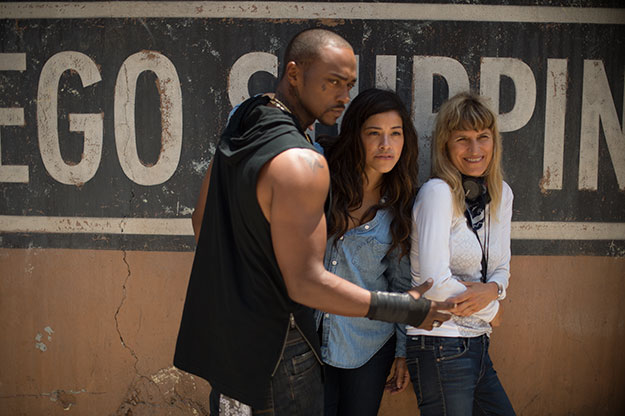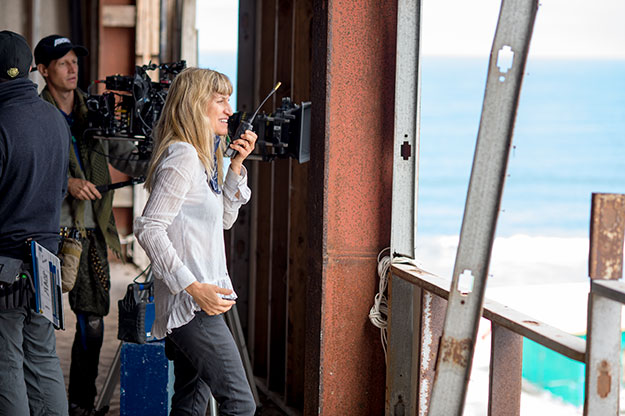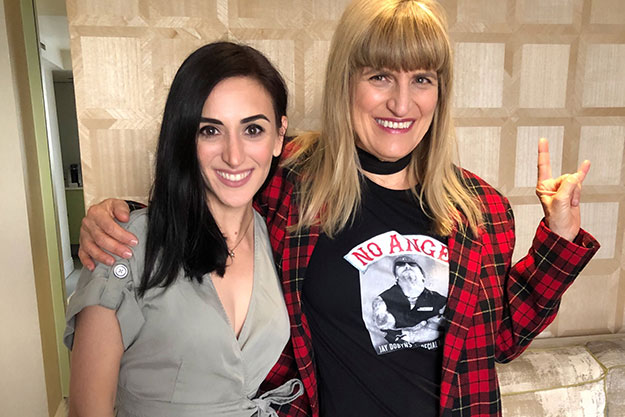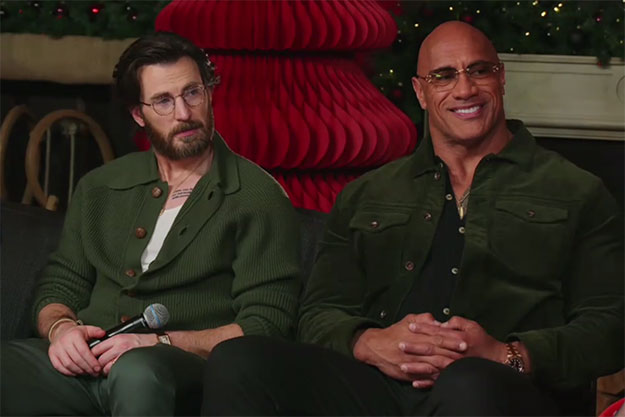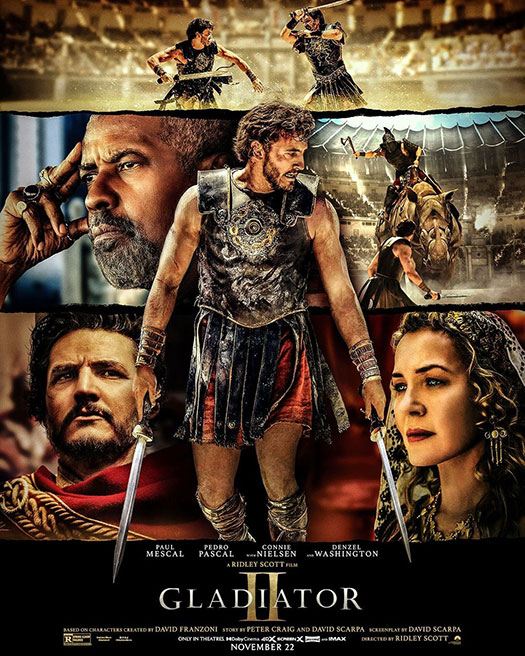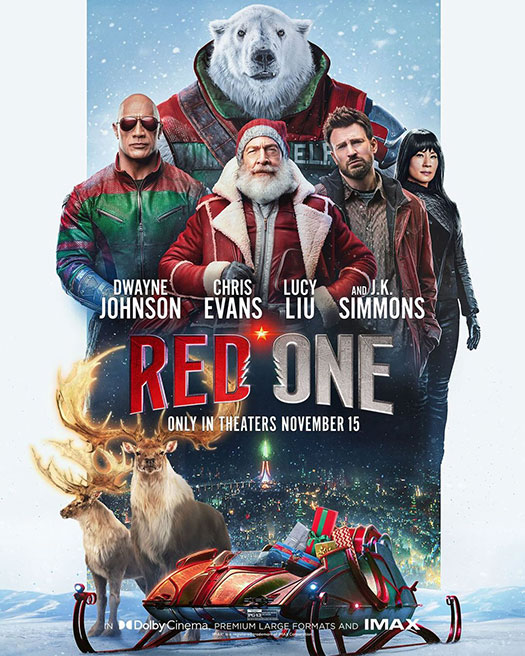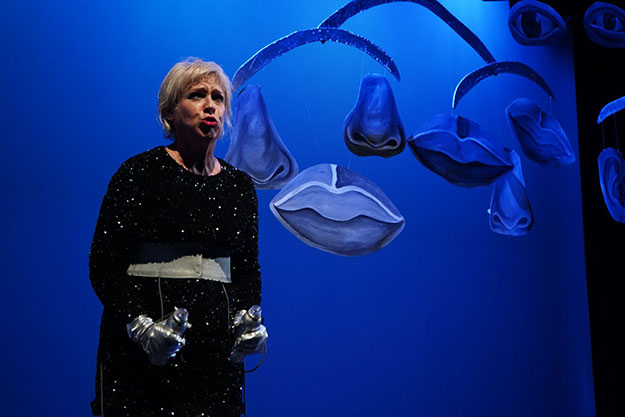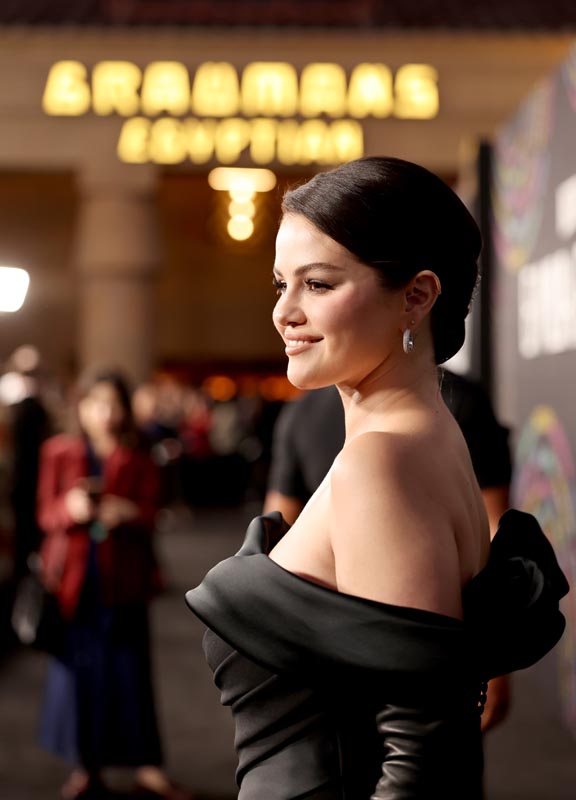‘Miss Bala’ Director Talks Her 95% Latino Cast & Crew and How She Never Stops The Hustle
'Miss Bala' is an upcoming 2019 action thriller film based on the original 2011 Mexican Spanish version by writer and director Gerardo Naranjo. The upcoming 'Miss Bala' directed by Catherine Hardwicke and written by Gareth Dunnet-Alcocer stars two Puerto Rican actors, Gina Rodriguez, and Ismael Cruz Córdova and American actor Anthony Mackie. The film follows a young woman, Gloria (Gina Rodriguez), who is a makeup artist from Los Angeles, that visits her best friend Suzu in Tijuana, Mexico and has no choice but to go into the drug cartel underworld after her friend suddenly disappears at a nightclub. In the process of searching for and rescuing her friend Suzu (Cristina Rodlo) who was kidnap by the cartel, Gloria gets kidnapped herself and is forced to smuggle laundered money for a drug cartel into the United States. She works her way into the good graces of their leader Lino (Ismael Cruz Córdova) as well as the DEA, which also takes part in this case. Gloria must do all it takes to survive and escape, and finds a power she never knew she had when she faced the world of cross-border crime.
We had the opportunity to sit down with director Catherine Hardwicke to talk about the movie and her career trajectory, as she is definitely a fierce but gentle soul who is not afraid to reinvent herself and tackle all aspects of the creative world and entertainment industry, as well as being an avid advocate of inclusion and equality. She managed to do a Sony Pictures production with a 95% Latino cast and crew and we the Latino community are so very proud and grateful to her.
Entertainment Affair: You are a director but I know you're an architect as well, right?
Catherine Hardwicke: Yeah. I worked as an architect.
EA: For how long?
CH: Well I worked about three and half years but I got to build a lot of stuff right away. Right on la Frontera de Tejas, to build this whole community, which was really fun and amazing.
EA: I'm an architect as well. And I did a change of career for entertainment. So I'm like Oh My God you too as well, so I wanted to know everything. Like what made you change into film?
CH: I went to UT. Where did you go?
EA: University of Michigan in Ann Arbor.
CH: Oh Awesome!
EA: Oh Yeah.
CH: I did my five year professional degree, came right out and then started building this big, kind of cool project. One hundred and twenty townhouses around a lake, we designed the streets, the roads, everything. And it was really fun and very creative. But then I saw that everybody was under a lot of regulations and a lot of city hall meetings, a lot of contractors and details, and in a way not super creative because once I created this design, it was, oh let's do the same thing over and over and over. I think I need to do something that encouraged creativity and I thought maybe film. I thought building these sets for films, right, maybe I would come out to do these sets and I came to UCLA film school. I got in. I just hadn't heard anything of UCLA before. And then I saw animation. So I said I want to be an animator because then I can just draw everything. And then I got into animation school but there were not that many jobs, you had to go into another big factory if you wanted to be an animator. So suddenly, I got to do the set design for movies, you know, building the sets. I loved it. And then I started writing my own scripts between jobs. I would write a story and then make a short film. And finally I got to make my first movie Thirteen.
EA: And that was my other question. How do you go from project to project? Do you pitch them or are you getting the projects? And how do you pitch the projects?
CH: Because it's both ways. Okay. Sometimes I'll just have my own idea like 'Thirteen'. I want to make this movie about a teenage girl that has all these issues and problems. So I worked with her. We wrote the script and I went and pitched it. I made like a book, like here are the ideas. Here's the images. How she could dress, how she could look, and then I sought somebody to give me the money to make it. And then after that, then people will send you scripts. Like, ok we are thinking about making a movie, a scary movie or this other movie. Are you interested? Or we have a book, Twilight. Are you interested? So sometimes it's like your own idea, that I want to do this. And sometimes people are sending you stuff, and then you connect to it in some way.
EA: How hard did you find it to transition into film. 'Cause it's like in my case, I feel sometimes people are a little skeptical because the film has been my, or entertainment, has been my second career. Right. And they're like, they feel a little bit like you didn't have this passion all your life but just now. Have you experience something like that?
CH: I think I see, yea, that that could be the case. I can't say that I watched, you know my hometown in South Texas wasn't like a film town. You know like, you never, you know whatever. So it's not like I grew up in the cinema every day because I grew up like playing in the Rio Grande River and rope swings, like a crazy childhood. So for me it wasn't like every day. But then when I found it like you probably did. I started really loving it even more, not taking it for granted. And then just diving into it 100 percent and just living it and breathing it 100 percent.
EA: Yeah. And also as a female filmmaker what are the challenges and how are you breaking the biases in the industry?
CH: So many challenges. Because even we just found out in the new report last year, the numbers even went down for female filmmakers, they just made the report a few weeks ago, that said it was even less females directing studio films. Top hundred films. So it's like a little bit up and down then up and down. Yeah I feel like you know for one thing as a woman I have to try to come into the studio to pitch my idea, or to interview for the job, and be as prepared as I can, do as much work as I can. So that I'm almost bulletproof. You know like, I've got to have seen every film they're going to ask me about, I've got all my images together. I've just done so much work.
EA: You got the eye of the architect for all these details.
CH: Exactly because we have to go macro to micro. We have to go through every level, think of every detail. How's that going to be joined but also how does that fit in. And so all of that you know, creating a world or a building, you know, creating a whole special world like in this movie. I really wanted to shoot it in Tijuana. I don't want to go to Atlanta and try to fake Tijuana. I don't want to go to Albuquerque, I want to shoot it in the real place and find some modern architecture. You saw some cool modern architecture in there, and feature it, and you know, show it off. So it's not the old Mexico. I want it to look vibrant and alive.
EA: And I have this other question because I'm Puerto Rican, as well, and the 2 leads are Puerto Ricans, so how do you feel people are taking that they're not Mexican but playing Mexicans?
CH: Well OK for one thing. You know, we don't know who Lino's father is. He doesn't know who his father is. So his father could have been Puerto Rican. All he says is, I had to grow up in Bakersfield, in Tijuana, on both sides of the border. He has an identity kind of crisis in a way. And she kind of has an identity but we don't know who her two parents are either maybe one of her parents is Puerto Rican but she grew up part of the time in Mexico. And part of the time in the U.S. So I thought it was very fascinating. You know, so many friends and people I know they are from a second generation, a third generation. They do not speak Spanish fluently or Vietnamese or wherever they're from. They don't speak it fluently but they do look different maybe do not feel like normal American but they also aren't Vietnamese, or they're not Mexican. So I thought there was an identity sort of issue that a lot of people can learn. Lots of people can relate to it especially as our country gets more diverse by the minute. And so it addresses those issues which is pretty cool.
EA: So when they were supposed to do lines in Spanish there was no approach on, you have to do a Mexican accent?
CH: Oh yes. There was, yes, because Ismael, he's not speaking with a Puerto Rican accent. We had an actor from Tijuana that was the coach, the dialect coach, and he was sitting there every day and really trying to help you, know Ismael, have the "Norte accent" from Tijuana not from Texas, not from Mexico City. Even the Mexico City actors had to try to sound more like they were from Tijuana. So we were trying hard to get the Tijuana accent and we had a lot of people from Tijuana in the movie.
EA: And I know that when you casted Ismael, it was like the first one you saw and you loved him. Was it the same thing with Gina or how was the casting process?
CH: With Gina, you know, we know her from Jane the Virgin. She’s very good. And so like in a weird way, she was kind of perfect because she can be like very nice, like that cute nice normal kind of looking, the girl next door but you know from the red carpet she can look fabulous, and then you know, from her boxing, she can be strong in that, she has a strong core. So she could do every level. And so I was just kind of, just, it's gonna be her. Yeah.
EA: And what's next for you?
CH: Well I'm just like all of us directors. We have to work on a few projects. You water the plants you work, and you hope, and see which one will grow, like, this is actually one that I'm working on which is about a real guy that was an ATF agent in Arizona, and a woman was murdered Cynthia Garcia. She was a mother of five kids. She was murdered by the Hells Angels. So this cop went undercover to help solve the murder. So it's kind of a crazy story. True story. So that's one, and there's another one with Katzenberg it's set in the future a little bit, you know. So, there's I don't know. Yeah. Fingers crossed one of them will go.
EA: What about TV?
CH: I love television too. Like the one with Katzenberg is TV. And I just did an episode of 'This is us'. I just directed one episode but I've got like three projects that are growing, you know they're my babies. I'm trying to like, okay... Another draft of this script, another draft, like we're trying to grow them, and I hope one of them will happen.
EA: You still writing more stories?
CH: Yeah. I just wrote a little short film, we shot it two weeks ago. That was fun. You know it's like a test for one of these TV things. I'm always, we're always always working in like 10 things. You have to hustle every moment.
Miss Bala is now playing in theaters everywhere.

